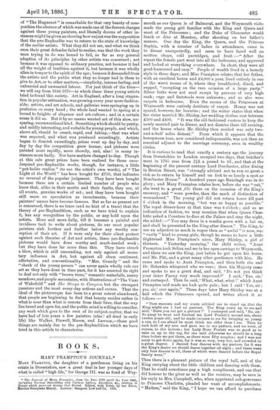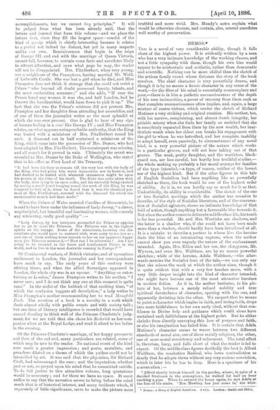BOOKS.
MARY FRAMPTON'S JOURNAL.*
MART FRAMPTON, the daughter of a gentleman living on his estate in Dorsetshire, saw a great deal in her younger days of what is called "high life," for George III. was as fond of Wey- • The Journal of Mary Frampton. from the Year 1779 mita ihs Year 1846, including Various Interesting and Curious Letters, Anecdotes, ,tc., relating to Events which occurred during that Period. Edited, with Notes. by her Niece, Harriot Georgians Mundy. London Sampson Low and Co. MS.
mouth as our Queen is of Balmoral, and the Weymouth visits made the young girl familiar with the King and Queen and most of the Princesses ; and the Duke of Gloucester would lunch or dine at Moreton, after shooting on her father's manors. One day the King, the Queen, and the Princess Sophia, with a number of ladies in attendance, came in to dinner unexpectedly, and seem to have fared well on mutton chops, cold partridges, and fruit :—" After the repast the female part went into all the bedrooms, and approved and looked at everything everywhere. In short, they were all good-humoured and easy." People of wealth lived in a homely style in those days ; and Miss Frampton relates that her father, with an excellent house and 24,000 a year, lived entirely in one of the worst rooms of it, where they breakfasted, dined, and slapped, "excepting on the rare occasion of a large party."
Silver forks were not used except by persons of very high rank ; rugs and footstools were unknown ; and so also were carpets in bedrooms. Even the rooms of the Princesses at Weymouth were entirely destitute of carpet. Money was not spared, however, for luxuries ; and the writer states that when her sister married Mr. Shirley, her wedding clothes cost between 2300 and 2400. "It was the old-fashioned custom to keep the newly married pair to dinner, and not dismiss them till evening, and the house where Mr. Shirley then resided was only two- and-a-half miles distant." From which it appears that the honeymoon tour, now considered indispensable, was not then an essential adjunct to the marriage ceremony, even in wealthy circles.
It is curious to read that exactly a century ago the journey from Dorsetshire to London occupied two days, that butcher's meat in 1785 rose from 211 a pound to 4d., and that at the beginning of the present century Lord Dorchester, after dining in Bruton Street, was "strongly advised not to run so great a risk as to return by himself and on foot to so lonely a spot as Dorchester House." A hundred years ago Ranelagh was in its glory ; and Mary Frampton relates how, before she was "out," she went to a great fate there on the occasion of the King's recovery, and "wore powder, then the mark of distinction of womanhood." The young girl did not return home till past 6 o'clock in the morning, "but was as happy as possible." The royal dinner-hour at that time was 4 o'clock ; and as an indication of fashion, we may mention that when Queen Char- lotte asked a Countess to dine at the Palace and stay the night, she added :—" You may dress in a muslin gown with a bat on, and shall be presented to the King after dinner." The King, to use an adjective as much in vogue then as "awful "is now, was " vastly " kind to young girls, though he seems to have a little frightened Miss Frampton's niece, Mary Shirley, a girl of thirteen. "Yesterday morning," the child writes, "Aunt Frampton took Selina and me in her open carriage to Weymouth, and there we saw the King, just before he got upon his horse, and Mr. Pitt, and a great many other gentlemen with him. He came and spoke to Aunt Frampton, and then both she and Dr. Heberden whispered who we were ; then his Majesty came and spoke to me a great deal, and said, Do not you think your sister Fanny very much improved ?' I said, Yes, sir,' and curtseyed. Then he said, What, what, what !' which Aunt Frampton said made me look quite pale ; but I said Yes, sir ; yes, sir,' over again." Three days later Mary Shirley was at a ball which the Princesses opened, and writes about it as follows :—
" Then mamma and my aunts advised me to stand up, that the King might see I had no partner. The King came up to me and said, Have you not got a partner ?' I curtseyed and Raid, No, sir.' So away he went and fetched me Lord Poulett's second son, about twelve years old ; and he made excuses to me for bringing so young a one, so I am afraid he most think me older than I am. Then he took hold of my arm and gave me to my partner, and we went, of coarse, to the bottom ; but Lady Mary Ponlett was so good as to take us up to the top, for she said otherwise we should be a long time before we got there, as there were fifty couples ; and I was not sorry to get down again, for it was so very, very hot, and crowded to a great degree. I danced four dances with my partner, for it was the King's desire we should dance together all night ; and there were only four dances in all, three of which were danced before the Royal family went."
Then there is a pleasant picture of the royal ball, and of the King carrying about the little children and dancing with them. That he could sometimes pay a high compliment, and one that did honour to the giver as well as the receiver, may be seen in his reply to Mrs. Campbell, who, when appointed sub-governess to Princess Charlotte, pleaded her want of accomplishments. "Madam," said the King, "I hope we can afford to purchase accomplishments, but we cannot buy principles." It will be judged from what has been already said, that the letters and journal that form this volume—and we place the letters first, since they fill the largest space—consist of the kind of gossip which is chiefly interesting because it relates to a period not indeed far distant, but yet in many respects unlike cur own. Reminiscences that begin in the reign of George III. and end with the marriage of Queen Victoria, cannot fail, however, to contain some facts and anecdotes likely to attract attention, and open what page he may, the reader will not be disappointed. Mrs. FitzHerbert, when very young, was a neighbour of the Framptons, having married Mr. Weld, of Lnlworth Castle. She was but a girl when he died, and Miss Frampton does not think it strange that she could not resist a Prince "who beyond all doubt possessed beauty, talents, and the most enchanting manners ;" and she adds, "If ever the Prince loved any woman it was she, and half London, had he thrown the handkerchief, would have flown to pick it up." The fact that she was the Prince's mistress did not prevent Mrs.
Frampton and her daughter from attending her assemblies, and of one of them the journalist writes as the most splendid at which she was ever present. One is glad to hear of any sign of human feeling in a roue like George IV.; and Miss Frampton relates, on what appears unimpeachable authority, that the King was buried with a miniature of Mrs. FitzHerbert round his neck. A diamond cut in half contained a miniature of the King, which came into the possession of Mrs. Darner, who had been adopted by Mrs. Fitz Herbert. The counterpart was missing, and all search for it proved in vain. Ultimately the secret was revealed to Mrs. Darner by the Duke of Wellington, who stated that in his office as First Lord of the Treasury, "It had been his duty to remain till the very last with the body of the King, who had given him strict injunctions not to leave it, and had desired to be buried with whatever ornaments might be upon his person at the time of his death. The Duke was quite alone with the body, then lying in an open coffin, and his cariosity being excited by seeing a small j2.wel hanging round the neck of the King, be was tempted to look at it, when he found that it was the identical por- trait of Mrs. EitzHerbert, covered with the diamond for which the unsuccessful search had been made."
When the Prince of Wales married Caroline of Brunswick, he is said to have been under the influence of Lady Jersey, " a clever, unprincipled, but beautiful and fascinating woman, with scarcely any retrieving, really good quality"
"Lady Jersey, by her intrigues, persuaded the Prince to appoint her to go to meet the Princess. The Princess was in the highest spirits on the voyage. Some of the attendants, knowing the dis- comforts she would have to contend with, were sorry to see her so ; and one of them making some remark to her on her apparent happi- ness, the Princess answered,—` How can I be otherwise ? Am I not going to be married to the finest and handsomest Prince in the world, and to live in the most desirable country in Europe ?' "
Of Continental warfare, of British victories, and of uproarious excitement in London, the journalist and her correspondents have much to say. The early years of this century were stirring times, and when the allied Sovereigns appeared in London, the whole city was in an uproar. "Anything so enter- taining as London," James Frampton writes to his mother, "I never saw ; and I do not think any one at this moment is quite sane." In the midst of the hubbub of that exciting time, "of which the confusion beggars all description," a lady writes to Miss Frampton's mother recommending her to read Mansfield Park. The mention of a book is a novelty in a work which deals almost wholly with public events and with society talk ; but one item of literary intelligence is recorded that would have caused Southey to think well of the Princess Charlotte's judg- ment, for we are told that she chose his lioderick as her com- panion when at the Royal Lodge, and read it aloud to her ladies in the evening.
Of the Princess Charlotte's marriage, of her happy prospects and then of the sad end, many particulars are related, some of which may be new to the reader. No national event of the kind ever made a greater impression ; and poets, moralists, and preachers dilated on a theme of which the pathos could not be intensified by art. It was said that the physician, Sir Richard Croft, had mismanaged the case ; and the imputation, whether just or not, so preyed upon his mind that he committed suicide.
To do full justice to this attractive volume, long quotations would be necessary ; and for these we have no space. It must suffice to say that the narrative serves to bring before the mind
much that is of historical interest, and many incidents which, if se.; arately of little significance, serve to make the picture more
truthful and more vivid. Mrs. Mundy's notes explain what would be otherwise obscure, and contain, also, several anecdotes well worthy of preservation.



































 Previous page
Previous page